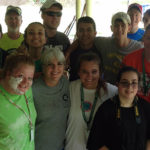Internet rumors
Your package of articles on Internet rumors (Oct. 19 ) was excellent. You are correct in saying Christians should hold ourselves to the highest standards in truth-telling.
When we forward an e-mail, we are also forwarding our reputation. We are endorsing the content of the message. We are vouching for the authenticity of the message. We cannot hide by saying, “Oh, I was only forwarding a message I received.”
The Bible says we are not to bear false witness, and we will be held accountable for what we do and say. This includes electronic messages.
Before forwarding an e-mail, we should verify the accuracy of the message and do some honest soul-searching. We should ask ourselves: “What is my real motivation for sending this message? What does this say about my Christian faith?”
Also, if we learn that have forwarded an untrue e-mail, we should send a correction and an apology to everyone who received the original message. This is the ethical thing to do. I have great respect for a friend who does this consistently.
Having read your article on rumor-mongering, I pledge to be even more careful about e-mails that I write and, especially, those I forward.
Bill L. Campbell
Denton
Sign up for our weekly edition and get all our headlines in your inbox on Thursdays
I no longer have the faith I was raised with, but your article on Internet rumor-mongering (Oct. 19) was a powerful read.
Among other things, I very much remember hearing about the Proctor & Gamble rumors straight from the pulpit when I was a kid and wondering how that could possibly be true, and then, when I found out it wasn’t, what that said about the pastor’s credibility.
Would that more of us—of all faiths and political interests—could be as honest as this article.
Mark Blacknell
Arlington, Va.
Who needs NAMB?
I both agree and disagree with Mick Tahaney, who asked, “Who needs NAMB?”—the North American Mission Board (Oct. 19 ).
I agree that “people in far remote areas of this world” need to hear the gospel. It is shocking that only 1 cent out of every $100 given by Christians is used to reach the 27.9 percent of the world’s population who are classified as “unreached.”
I disagree that “once (we share) the gospel, our work is done.” In Matthew 28:19-20, Jesus tells us to go and make disciples in every people group by teaching (training) them to obey all his commands.
Interestingly, on the same page, Bill O’Brien reports, “Students (in the Global Mission Leadership program at the Baylor School of Social Work) entered into a covenant agreement to become disciplers—trainers of trainers. The program is designed to reproduce itself continuously.” Apparently, they get it!
Larry Burner
McKinney
I would like to respond to Mick Tahaney’s question, “Who needs NAMB?” I did.
I grew up in a mainline denomination and had a wonderful religion—just no relationship with Jesus. I was one of those college kids who ate the meal provided by a church at the Texas Tech Baptist Student Ministry.
I also received more than a meal. As a result of being loved, I received Jesus as my Savior and Lord.
Thank God for the BSM, for the local churches and for NAMB. Lost people don’t just live across the ocean; they also can live across the street.
Donald J. Myers
Wills Point
In response to Mick Tahaney, I do agree that the North American Mission Board is based on a faulty premise, but not for the reasons he states.
I propose NAMB resources need to be solely focused on planting churches in regions with no convention strong enough to do the work on their own. The Northeast and Northwest United States and Canada are prime examples.
Likewise, since mission trips are some of the best growth opportunities for Christians, strong state conventions should make it logistically easy for their churches to send teams to support evangelism in these unreached areas.
Ben Macklin
Vernon
Jefferson’s ‘wall’
Thomas Jefferson’s “wall of separation” does not appear in the U.S. Constitution. However, the Supreme Court cited the metaphor in a unanimous decision in 1879 and again in 1947. Article 11 of the Treaty of Tripoli, ratified by the Senate in 1797, begins, “As the government of the United States of America is not, in any sense, founded on the Christian religion … .” The treaty was reaffirmed during the Spanish-American War.
President John Tyler wrote, “The United States have adventured upon a great and noble experiment … that of total separation of church and state.” Abraham Lincoln thwarted attempts to pass a constitutional amendment that would have established the United States as a Christian nation.
It’s not just distant history. When Iraq attempted to rewrite their constitution, the government wanted to declare the nation the “Islamic Republic of Iraq,” similar to the official names of Afghanistan, Iran and Pakistan. Arab nations have declared their willingness to recognize the “state of Israel” but not the “Jewish state of Israel” for fear that Muslims and Christians will be second-class citizens. American authorities vetoed the effort of the Iraqi government to declare itself an Islamic state for the same fear for the rights of minorities.
The attempt by some to declare the United States a Christian nation is not an idle gesture. It is an attempt to gain power and control over those with other or no belief.
Robert Flynn
San Antonio
Great things at DBU
I recently had an opportunity to speak at the chapel service for Dallas Baptist University. Although I had heard of the great things going on at DBU for some time, it was my first opportunity to see and experience the campus and people of DBU myself.
I cannot begin to express how impressed I was. The campus is beautiful and well maintained. I was overwhelmed by the new chapel, which housed over 1,000 students during the service. The students were sharp, respectful, receptive and friendly. President Gary Cook and the faculty were wonderful hosts as well.
As a current member and past chairman of the vocational theological education subcommittee of the Texas Baptist Executive Board, I have been impressed with the increasing number of students preparing for ministry at DBU. After my visit, I can certainly see why.
It is clearly and unapologetically a Christ-centered university that seeks to integrate excellence in service to Christ with excellence in academics.
I am so proud of what God is doing through the leadership of Dr. Cook and the faculty at Dallas Baptist University. I can’t wait to see how God is going to bless others through the students of DBU.
Bruce Webb
The Woodlands
Clergy infidelity
The best deterrent to clergy sexual infidelity is never to be alone with a congregant of the opposite sex. This means not meeting at the church office if an assistant or staff person is not there. I always had a home with a room where I could counsel in private when my wife was in the house.
I was a pastor who counseled, not a counselor. After two sessions, I usually referred the individual to a counselor.
When my congregation included women in upper management, I had to reassess where the dangers would be. When I had a luncheon meeting, I told the administrative assistant where I was going and when I expected to return. At lunch, we met at a restaurant well visited by the public. The subject was friendly, but the subject primarily was business. My wife also knew I had that meeting; this helped home relationships through understanding.
If I were building a church, I would reluctantly place a small glass pane on the office door. It would keep me honest because any one in the office could pass by and observe. Also, if a counselee accused the minister of sexual advances behind closed doors there is no defense except “he said/she said.” The typical church will dismiss the minister at the expense of truth because it values the institution more.
These are practical ways to avoid the temptation of trouble. If we avoid the temptation, there will be no trouble.
Gerard Howell
Lexington, Ky.
What do you think? Because we affirm the Baptist principle of the priesthood of all believers, we value hearing from our readers. Send letters to Editor Marv Knox by mail: P.O. Box 660267, Dallas 75266-0267; or by e-mail: [email protected]. Due to space considerations, limit letters to 250 words, and only one letter per writer per quarter.














We seek to connect God’s story and God’s people around the world. To learn more about God’s story, click here.
Send comments and feedback to Eric Black, our editor. For comments to be published, please specify “letter to the editor.” Maximum length for publication is 300 words.